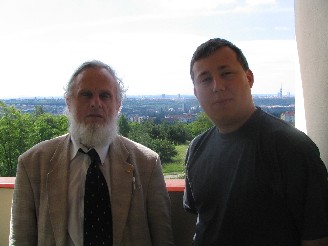
Mathematical fuzzy logic
Petr Hájek and
Petr Cintula
Institute of Computer science
Academy of Sciences of the
Czech republic - Prague Czech Republic
Lecture notes (see A and B )
Description of the contents of the tutorial:
ˇ
Vagueness, fuzziness vs. probability, comparative degrees of truth,
standard [0,1]-valued semantics, t-norms, residua
ˇ Fuzzy
propositional calculi: axiomatic systems MTL, BL, and their schematic
extensions (incl. Lukasiewicz and Gödel-Dummett logics)
ˇ
Algebraic semantics: Hajek's BL-algebras, Chang's MV-algebras,
etc.
ˇ
Theorems: completeness, subdirect decomposition, deduction, compactness,
complexity issues
ˇ Adding
truth constants: Pavelka style extensions
ˇ Fuzzy
predicate calculi: Tarski semantics, completeness and incompleteness
results, arithmetical hierarchy
ˇ Proof
theory: hypersequent calculi
ˇ
Alternative semantics: Kripke and game-thoretic semantics
ˇ
Functional representation: McNaughton functions, Pierce-Birkhoff
conjecture
ˇ
Extending language: logics with globalization, involutive negation,
additional conjunction
References
1. F.
Esteva and L. Godo: Monoidal t-norm based logic: towards a logic for
left-continuous t-norms, Fuzzy Sets and Systems 124/3, (2001),
pp.271-288.
2.
S.Gottwald, A Treatise on Many-Valued Logics, Research Studies Press,
Baldock, 2000.
3. K.
Gödel, Zum intuitionistischen Aussagenkalkül, Anzieger Akademie der
Wissenschaften Wien, Math. - naturwissensch. Klasse, 69 (1932),
pp.65-66.
4. P.
Hájek, Fuzzy logic and arithmetical hierarchy III, Studia Logica, 68
(2001), pp.129-142.
5.
P.Hájek, Metamathematics of Fuzzy Logics, Kluwer, Dodrecht,
1998.
6. P.
Hájek, Why Fuzzy Logic?, in A Companion to Philosophical Logic, J. Dale
(ed), Blackwell Publishers, Massachusetts, 2002,
pp.595-605.
7.
P.Hájek, J. Paris, and J. Shepherdson, The Liar Paradox and Fuzzy Logics,
Journal of Symbolic Logic, 65/1 (2000), pp.339-346.
8.
Novák, I. Perfilieva, and J. Močkoř, Mathematical Principles of Fuzzy
Logic, Kluwer, Norwell, 1999.
9. J.
Lukasiewicz, A. Tarski, Untersuchungen über den Aussagenkalkül. Comptes
Rendus de la Siciete des Sciences et des Letters de Varsovie, cl. iii 23
(1930), 1-21.
Lecture
Notes will be available here by January 31th
2005.